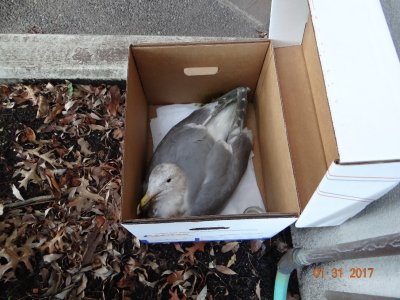Follow the (mis)adventures of the Port Biologist and learn about our work to preserve, protect and improve the environment.
As the Port Biologist, I get to see and hear the stories of when nature and industry intersect. Most of these stories are lighthearted, funny and/or wacky, and they are a lot of fun to share. Unfortunately, not every story is a happy one. Last week was one of my toughest weeks as the Port Biologist.
There is a surprising amount of biological diversity in the Tideflats. We have a variety of coyotes, rabbits, deer, beavers, frogs, fish, crows, gulls, seabirds and songbirds that reside in our habitat sites, waterways and open spaces. While most of the species we encounter tend not to be rare or exotic, they still provide an essential function in making an ecosystem tick.
Certain wildlife species are considered “pests” by some. Gulls, in particular, tend to elicit a strong response. They are loud and aggressive. They congregate in inconvenient areas and leave all kinds of messes for others to clean up. Gulls also are curious, nondiscriminatory eaters (think "Finding Nemo": “mine-mine-mine-mine-mine-mine-mine”).
Last week, some of them managed to get into trouble.

Late Sunday, Jan. 23, and early the next morning, reports started coming in of several dozen gulls turning up dead or sick around the Tideflats and Commencement Bay, including at the Port of Tacoma. Port staff immediately notified several agencies that respond to these situations. Representatives from the Washington Department of Fish and Wildlife (WDFW) and I spent the week responding to call after call of gulls turning up sick, dying or dead. I cringed every time the phone rang because it meant another gull had been found. What made it especially tough was that impacted gulls were unable to move but were aware of their surroundings. As we approached each gull, we witnessed their eyes dilate while their bodies betrayed them. They recognized a threat but could not get away or defend themselves. My determination to find out what caused this is driven by a mix of academic interest and compassion for these birds.
We captured as many sick gulls as possible to try to rehabilitate them back to health.
While they’re everywhere and often considered a nuisance, gulls are also a protected species. The Migratory Bird Treaty Act of 1918 prohibits people from pursuing, hunting, taking, capturing, killing or selling any bird considered to be migratory. This statute does not discriminate between live or dead birds. So even though gulls can be considered pests, they are protected pests; it is our duty to protect them just as we would protect an owl or a hawk or a songbird.
This situation was limited to gulls. No other birds were affected, even other scavengers, like crows. The Port follows strict housekeeping rules regarding keeping trash dumpsters under cover, and handling hazardous materials is heavily regulated. What caused the illness and deaths is truly a mystery. Fish and Wildlife sent samples off for lab analysis because there were no obvious signs of trauma, and necropsies yielded no real answers. That means we wait and wait for an answer. Without knowing what we are dealing with, we have no way of knowing how to prevent it from happening again.
One silver lining is that this appears to be an isolated event, and the number of reports has diminished significantly. Another silver lining is that some of the gulls taken to the PAWS Wildlife Rehabilitation Center in Lynnwood started showing improvement.
This also provides a good opportunity to share with you to be aware of your surroundings. If you see sick or injured wildlife, report it. But DO NOT try to move, touch or approach it. There are professions dedicated to helping sick and injured wildlife. Make sure you keep pesticides, poisons or other household hazardous materials (e.g., antifreeze) protected from any potential incidental contact with your own resident wildlife. And please remember, even if a critter is considered a pest, it may still be protected.
The Port is truly a unique place to work, and the opportunity for me to spend my days observing the interaction between nature and industry has me convinced that I have arguably the best job. But some weeks are just not fun.
*Fun fact: there is no such thing as a seagull. They are all just gulls. That’s why you can see these birds in places like Nebraska, where there is no sea for thousands of miles.
To reporting sick or injured wildlife:
Washington Department of Fish and Wildlife Enforcement
Phone: 360-902-2936
Email: ENFORCEMENT-WEB@dfw.wa.gov
